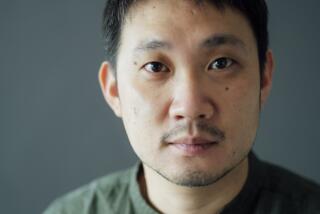Zen Master Influenced a Generation
- Share via
The son of a traditional Zen Buddhist priest in rural Japan, Shunryu Suzuki was born in 1904. Destined to become one of the great intermediaries in the westward flow of cultural and religious values from the Far East in the latter part of this century, he played a quite different role from the D.T. Suzuki with whom he is sometimes confused, who taught at Harvard and Columbia universities and published numerous books on Zen about the same time. “‘He’s the big Suzuki,” said Shunryu, with characteristic self-deprecation: “I’m the little Suzuki.”
“Crooked Cucumber” was the nickname he earned as a novice monk: He was the odd one in the barrel, quirky and severely absent-minded. Determined to follow in his father’s footsteps, he took on himself at the age of 11 a strict regimen of long zazen, or meditative sitting--with appropriate applications of the kyosaku, the stick whacked across the shoulders to rouse the sleepy or adjust the slacker’s posture--and rigorous daily chores.
In this thoroughly researched biography, David Chadwick, a Zen priest ordained by Suzuki in 1970, follows his mentor’s early progress from child to university student to priest and abbot, and through his quiet pacifism in the years of World War II.
In 1959, Suzuki finally achieved a long-held dream, moving to America to “teach Buddhism, for world peace.” He arrived in San Francisco at a propitious moment, when the poets and artists of the Beat generation were howling--to borrow a phrase--in search of an alternative to the endemic middle-class materialism of the postwar years. Attracted by Suzuki’s instruction in the simple, demanding discipline of daily sitting and by the non-dogmatic spiritual values of Zen Buddhist practice, they gravitated to his Zen Center. Suzuki transformed himself from a quiet monk into an inspiring and influential teacher, whose power resided more in the gentle but always rigorous example of his personal practice of silent meditation, ministry and daily ritual than in verbal message.
His influence continued to spread until his death in 1971. The San Francisco temple thrived and expanded, and in 1967 Suzuki and his associates founded the Zen Mountain Center at Tassajara in the wilderness behind the Big Sur peninsula. It was created to serve as a yearlong retreat for students and disciples and a summer hospitality center for the lay visitors who still go there from around the world seeking peace and serenity. “Zen Mind, Beginner’s Mind,” the book edited from Suzuki’s teachings about 30 years ago, is still a popular seller.
Chadwick’s biography is a loving tribute. The Suzuki he portrays was at once stern and playful, unassuming, yet sometimes also imperious and short-tempered. He consistently chose calling over family, leaving behind his children and, for an extended period, his wife in Japan when he first came to the United States. At the end of his life, he judged himself to have been a “bad father and bad husband,” but hoped to have been a good priest.
What the book lacks is the art of the storyteller: the feel for the essential, for light and shade, for pace and timing. Although the interspersing of often fascinating firsthand material from Suzuki’s teaching works well, a rather choppy episodic structure impedes the story’s flow.
The first third of the book risks losing the reader in family history and in the politics of Japanese temple priesthood before Suzuki gets clear on his mission to bring Buddhism to the West. Later, in San Francisco, we encounter a parade of associates and disciples about whom we learn little aside from names: I am left wanting to know more about Suzuki’s contact with such luminaries as Alan Watts and Trungpa Rinpoche, Allen Ginsberg and Gary Snyder, and less about the internecine struggles of board members.
Nonetheless, Suzuki left a lasting legacy as the man who introduced the spiritual discipline of Zen to the West Coast and thence to a still-thriving international community of grateful followers, and “Crooked Cucumber” affords a wonderful opportunity to meet him. It is also good to recognize that unwavering integrity, passionate commitment and dedication to mission can make as great a contribution in this contemporary world as flash and rhetoric.
*
Peter Clothier is the author, most recently, of “While I Am Not Afraid: Secrets of a Man’s Heart” (High Mountain Press) and “David Hockney” (Abbeville).


